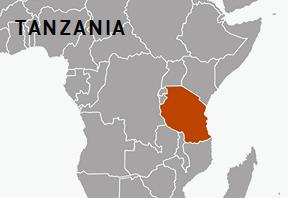Child Sponsorship
Child sponsorship helps provide a child with access to life-changing basics like nutritious food, clean water, healthcare, and education. Child sponsorship also helps families and communities lift themselves out of poverty by providing job training, business coaching, small loans, along with training to help poverty-affected farmers learn new ways to irrigate and grow crops.
Buhoma, Tanzania
Geography and people.
Bordered by eight countries, Tanzania sits on the eastern coast of Africa. The country’s three islands—Mafia, Zanzibar, and Pemba—lie to the east in the Indian Ocean. Three large lakes border Tanzania, and Tanzania’s northern area contains Mount Kilimanjaro, the highest point in Africa.
The climate varies from tropical along the coast to temperate in the highlands. Natural resources include hydropower, natural gas, iron ore, tin, nickel, phosphates, coal, diamonds, gemstones, and gold.
Almost all of Tanzania’s population is of Bantu origin, representing more than 130 tribes. Swahili and English are the country’s official languages; Tanzanians often use English in commerce, administration, and higher education.
Tanzanians usually live with their extended families in huts that are clustered together. The majority of the population lives in rural areas. Many Tanzanians are small-scale farmers growing only enough food to feed their families.
Transnational Issues.
Tanzania is a source, transit, and destination country for men, women, and children subjected to forced labor and sex trafficking; the exploitation of young girls in domestic servitude continues to be Tanzania’s largest human trafficking problem; Tanzanian boys are subject to forced labor mainly on farms but also in mines, in the commercial service sector, in the sex trade, and possibly on small fishing boats; internal trafficking is more prevalent than transnational trafficking and is usually facilitated by friends, family members, or intermediaries offering education or legitimate job opportunities; trafficking victims from Burundi, Kenya, Bangladesh, Nepal, Yemen, and India are to work in Tanzania’s agricultural, mining, and domestic service sectors or may be sex trafficked.
Tanzania still hosts more than a half million refugees, more than any other African country, mainly from Burundi and the Democratic Republic of the Congo, despite the international community’s efforts at repatriation; disputes with Malawi over the boundary in Lake Nyasa (Lake Malawi) and the meandering Songwe River remain dormant.
Why We Partner With World Vision
Since 2003 SCAC has been sending teams solely to one location in East Asia. As that work deepened and widened we sensed God calling us to expand our influence for the Kingdom. In 2011 we began praying as a church for another country to invest in. During our research, prayer and learning process we were further burdened to be involved in “greater works” that we could never do on our own.
Confronting issues of extreme poverty, access to clean water, education, human trafficking, and adequate healthcare require collaboration and partnerships. In 2013 we were invited to participate in a vision trip to Tanzania sponsored by World Vision. We saw their amazing and effective work firsthand and began a formal partnership with World vision soon after.


